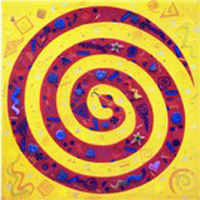By Rabbi Leonard Rosenthal

 SAN DIEGO — One of the most commented upon panels in the fused glass sculpture of the Twelve Tribes of Israel in the lobby of Tifereth Israel Synagogue is the one which portrays Dan. Dan is symbolized by a snake, which seems to be an unusual metaphor for the ancestors of the Jewish people.
SAN DIEGO — One of the most commented upon panels in the fused glass sculpture of the Twelve Tribes of Israel in the lobby of Tifereth Israel Synagogue is the one which portrays Dan. Dan is symbolized by a snake, which seems to be an unusual metaphor for the ancestors of the Jewish people.
This image of the snake, however, comes straight from the Torah. When at the end of his life, Jacob blesses Dan saying:
“Dan shall be a serpent by the road,
A viper by the path,
That bites the horse’s heels
So that the rider is thrown backwards.” (Gen. 49:17)
According to our Etz Hayim Torah commentary, “This rather violent prediction about the tribe of Dan is commonly related to the career of Samson, a warlike leader who came from that tribe.” (Etz Hayim, p. 303)
Samson was one of the last Judges of Israel. In the Bible, a Judge is more a political and military leader than an arbiter of legal disputes. Samson was a mighty warrior but a weak and coarse human being. He won many battles against the Philistines until he allowed himself to be seduced by Delilah. Delilah cut off Samson’s hair, breaking the Nazirite vow which gave him strength.
The Philistines imprisoned him and gouged out his eyes. They tied him up in one of their pagan Temples. In a final act of courage and strength, Samson pulled out the pillars to which he was bound which supported the roof. He died alongside a large number of Philistines when the roof collapsed.
Jacob, our tradition says, foresaw Samson’s violent victory and so described his ancestor, Dan, as a serpent which bites and causes injury.
Jacob, however, follows his blessing of Dan with curious words which seem to come out of nowhere and do not fit with his blessing of Dan or the subsequent blessing of Gad: “I wait for Your deliverance, O Lord!” (Gen. 49:18)
Since the Torah does not explain what Jacob was referring to, the Biblical Commentators step into the breach.
The Ramban (Moshe ben Nachman Girondi, 1194-1270), also know as Nachmanides, wrote that Samson was the first Israelite Judge to fall in battle. Furthermore, he was the last Judge to engage in battle. Even though Samuel, who came after him, was also considered a Judge, he never engaged in warfare.
When Jacob foresaw the sad end of Samson, he realized that it was the end of an era. From that time forth, Jews could never expect a human being to save them from disaster. When he realized this, Jacob declared: “I wait for Your deliverance, O Lord!” acknowledging that God as our only source of salvation.
These same sentiments are echoed in the Kabbalistic prayer Berich Shemei deMarei Alma that we recite before removing the Torah from the Ark on Shabbat: “Not on mortals do I rely, nor upon angels do I depend, but on the God of the universe whose Torah is truth, whose prophets are truth, and who abound in deeds of goodness and truth.”
Similarly we read in the Passover Haggadah: “‘Then the Lord took us out of Egypt.’ Not by an angel. Nor by a seraph. Nor by a messenger. Rather, the Holy One Himself [rescued us from Egypt].”
To rely on God’s goodness and the goodness of life, despite the trials, tribulations, and adversity we may face, are the beginning and the end of faith. Even when human beings fail us, we know that we can count on God for the strength and support we need to get us through the most difficult and challenging times.
*
Rabbi Rosenthal is spiritual leader of Tifereth Israel Synagogue in San Diego